Many people want to develop better screen-time habits, but don’t have a good set of tools to do so. A new startup, Opal, aims to help. The company, now backed by $4.3 million in seed funding, has developed a digital well-being assistant for iOS that allows you to block distracting websites and apps, set schedules around app usage, lock down apps for stricter and more focused quiet periods, and more.
The service works by way of a VPN system that limits your access to apps and sites. But unlike some VPNs on the market, Opal is committed to not collecting any personal data on its users or their private browsing data. Instead, its business model is based on paid subscriptions, not selling user data, it says.
Timed with its public debut, Opal also today announced its initial financing in a round led by Nicolas Wittenborn at Adjacent, a mobile-focused VC fund. Other investors included Harry Stebbings, Steve Schlafman, Alex Zubillaga, Kevin Carter, Thibaud Elziere, Jean-Charles Samuelian-Werve, Alban Denoyel, Isai, Secocha Ventures, Speedinvest, and others.
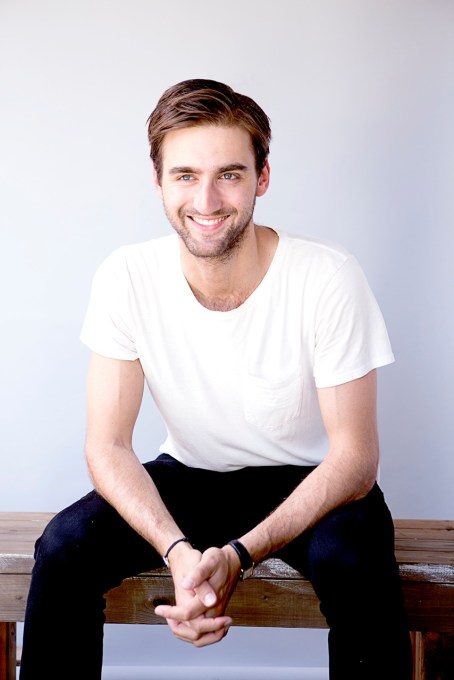
Image Credits: Opal, founder Kenneth Schlenker
The idea for Opal comes from Paris-based Kenneth Schlenker, a longtime technologist who previously founded and sold an art marketplace startup ArtList and later led mobility company Bird’s expansion in France.
Schlenker, who grew up in a small, quiet village in the Alps, says he got into technology at a young age.
“I sort of got obsessed, like many of us, by the potential of technology and its amazing power of attraction — making connections, learning new things, all sorts of incredible opportunities,” he explains. “But I’ve then spent the last 10 years and more trying to seek a balance between this need for connection and this need for disconnection.”
In more recent years, Schlenker came to realize that others were having the same problem, including those outside the tech industry. That drove him to build Opal, with the goal of helping people better achieve balance in their lives so they could reconnect with loved ones, spend time in nature or just generally go offline to focus on other areas of their lives.
At a basic level, Opal’s VPN allows users to block themselves from using dozens of distracting apps and sites for certain periods of time, including social media, news, productivity apps and more.
Social media, in particular, has been a huge problem in recent years, Schlenker says.
“In particular, Instagram, Facebook and Twitter — social media is where you feel like you’re learning something, and you feel like you’re connecting with people. So it’s good. But on the other hand, it’s very hard to stay intentional,” he explains. “It’s okay to pick up your phone and go to Instagram, but when you ‘wake up’ 30 minutes later, you usually feel really bad. You feel like, ‘where’s the time gone?’, ‘what did I just do?,’ ” he says.
Opal addresses this problem through a handful of features.
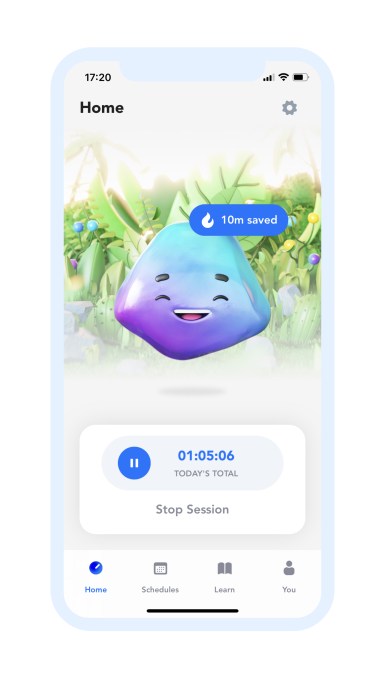
Image Credits: Opal
The free service allows you to block distracting websites and apps and take breaks throughout the day. By upgrading to the paid membership, Opal users can schedule time off from apps to establish recurring downtimes — whether that’s for family dinners or working hours, or anything else. They also can use a more extreme version of this feature called Focus Mode, which locks you out of apps in a way that’s not cancelable.
While the company is using a VPN to make this system work, it’s being transparent and straightforward about its data collection practices.
“There is zero private browsing data that leaves your phone,” Schlenker insists. “Anything you do on your phone outside of Opal’s app stays local on your phone and is never stored on any of our servers or any other servers. That’s very important to us,” he says.
From inside Opal’s app, the company claims it only collects usability and crash information — not browsing data. And the usability data is completely anonymized for another layer of privacy. Opal also doesn’t require an email to begin using the app. It only asks for one if you choose to pay.
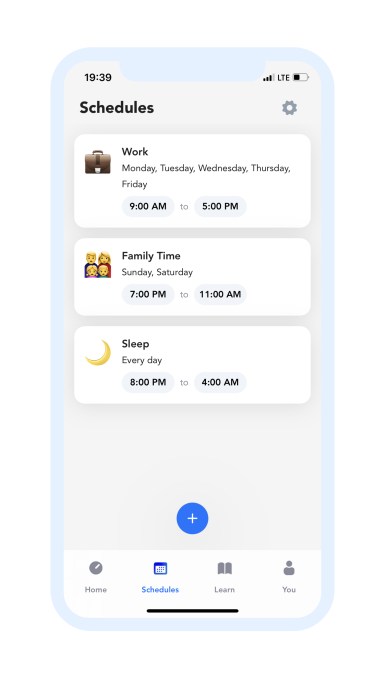
Image Credits: Opal
These core principles are also documented on Opal’s privacy page, and are why Schlenker believes his app won’t face the challenges that other screen-time apps on the App Store have experienced in the past.
As you may recall, Apple cracked down on the screen time app industry a couple of years ago — a move Apple said was focused on protecting user privacy, but has also been raised as a possible example of anticompetitive behavior. Many of the apps at the time had been using techniques Apple claimed put consumers’ privacy and security at risk, as they gave third-parties elevated access to users’ devices. This was particularly concerning because many of the impacted apps were marketed as parental control services — meaning the end users were often children.
Opal, meanwhile, is targeting adults, and perhaps teenagers, who want to develop better screen-time habits. It is not selling this as a parental control system, however.
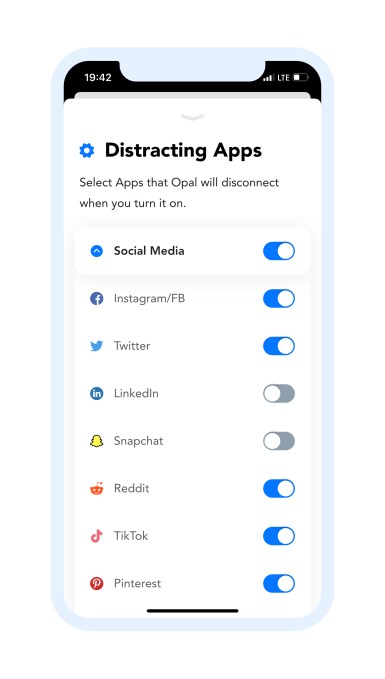
Image Credits: Opal
At launch, Opal can block over 100 apps and sites across several categories, including Facebook, Instagram, Snapchat, TikTok, Reddit, Pinterest, YouTube, Netflix, Twitch, Gmail, Outlook, Slack, Robinhood, WhatsApp, WeChat and others, including those in the news, adult and gambling categories.
Users can choose to block the apps for short breaks — 5, 10 or 60 minutes — throughout the day. You can also set an intention and set a timer before using an app, to help you avoid the issue of losing track of time. And you can set focus timers or scheduled times to automatically shut off app usage.
You can track your progress by viewing the “time saved” and you can share your successes across social media. In time, Schlenker plans to add more of a scoring mechanism to Opal that will help you stay accountable to your original goals.
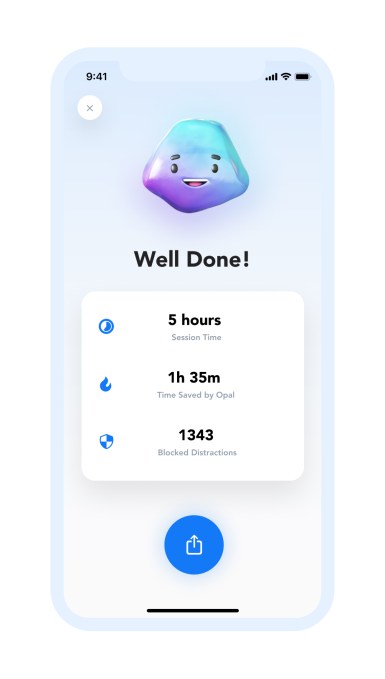
Image Credits: Opal
Though work on the app only began in 2020, Opal began attracting attention as it publicized its plans on Twitter and ran its private beta, which grew from hundreds to thousands of users this year, saving its users an average of two hours per day.
Though Schlenker had connections with many of the angel investors who have since backed Opal, he says the interest from institutional and larger investors was all inbound.
“It was not our intention to raise so much, so early,” Schlenker notes.
The funds will be used to help Opal grow its team, particularly engineering, design as well as product. The company will also soon launch a version of Opal for Chrome and later, Android, and will experiment with more social features around sharing and hosting group sessions.
The app is currently a free download on the App Store with an optional $59.99/year subscription plan.
Comments
Post a Comment